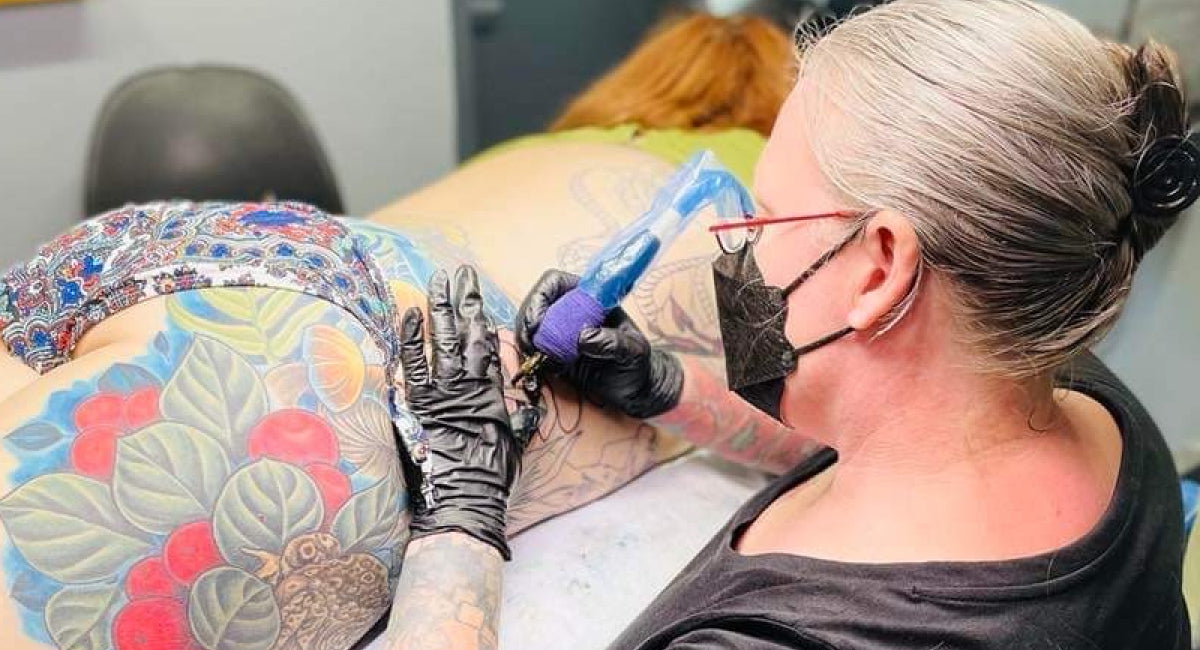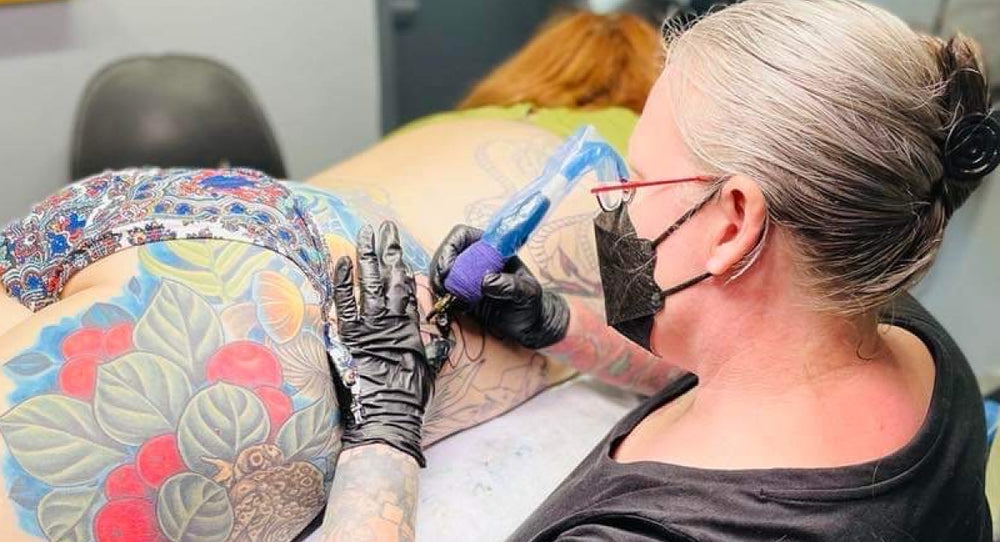Jen Stewart Talks Hamilton’s Vibe, Gardening and Her Next Big Move…

Patrick Cote: JEN STEWART, we’re FINALLY getting to meet and talk to each other! I’ve heard so much about you, I feel like we’ve been connected for so long but we’ve never met! How’ve you been?
Jen Stewart: YES! Hi, glad to do so! I’ve been great. It’s nice weather here still in Hamilton.
PC: Speaking of Hamilton, you've been there for a while and pretty much always at the same beautiful shop, right?
JS: Yes and Cottage 13 has been such a great family. Yolanda and Andrew, the owners, are great people and now family.
PC: Hamilton has been good for you?
JS: It’s been great for the past 24-ish years.
PC: So we’re off to a beautiful start already… Now, tell me a little about your beginnings, if I may ask! You’ve been at it for a while and that can be quite inspiring for many artists. Did you have a classic apprenticeship?
JS: Yes, quite a while...um, the 90s, maybe 94… Yes. Yes. Yes. So, I think the way that I started was pretty sketchy, probably a little bit all over the place. I mean, I would say that I was taught by a few people, not necessarily one. I don't think I had a real traditional tattoo apprenticeship at all.

I think it was the kind of thing where they were just like, “We're just going to make it real, real horrible and like, if you swim, you swim”, and I swam. I managed to kind of get through that and I did do a piercing apprenticeship which I think in the long run really helped me kind of get my foot in the door of shops that I wanted to work at.
Just like that. I think about when I first started making needles, building machines, cutting your springs… and like, that's gone, you know?
PC: AMAZING! You usually think of a scruffy dude using coils… But hey, that’s right - women were also making their needles, and using coil tattoo machines. Are you still using coils?
JS: Too many fumes… Still the same. Doesn't matter who. Lol!
Things have changed. Well it's still changing like, it's just going so fast now… It's pretty unbelievable. But back then you really had to be sort of a person of many different skills, right? I remember being told, there's great artists who have shitty tattoos because if you couldn't tune your machine or fix your clipcord or whatever, you were dead in the water, right?
These days you just send your machine back to get somebody else to fix it. There's no tuning. I think most people these days are using rotaries from what I see, including myself.

I’m not using coils any more. For me, leaving coils was a really emotional thing. I was in a lot of pain after I had my son, that was in 2006. Carrying a baby around and then working with these coils, I was getting a lot of pain and numbness in my fingers and switching to aluminum frames trying to lighten everything up, and it just wasn't working, you know?
I still have my “kids”. I have a lot of coils. I have a really cool puzzle frame that was made for me and little shorty coils and stuff. I still have all that stuff…
PC: I’ll bet there are some treasures in there! I also know you had your hand on a very important piece of tattooing history. You owned the very first Eikon power supply right? That’s pretty cool… I think it’s now in their archive.

JS: Yes it was! Eikon came to Nova Scotia and that was the first Eikon power unit with the Motorola chip in their regulated supply. I had that thing for years and I gave it back.
PC: How long would you say your tattoo schooling took? You know, like a couple of years of struggle, cleaning the bathrooms, making needles and all…
JS: Yeah, it was definitely that. Then, my partner at the time got a job with the CBC as a producer and we started moving around Canada, so I went to art school. At the time, I didn't like when I was piercing, apprenticing and doing the tattoo stuff and everything. I was also going to school and working a full-time job, and then we traveled through Canada and I wound up in Nova Scotia at the Nova Scotia College of Art and Design. Then I was offered an opportunity in Toronto and came to Ontario, and I've been in Ontario since the 90s… 97/98 I guess. Yeah, something like that.
PC: You're a scholar of the fine arts basically then, and that was the path that led you to tattooing. So you're an artsy person. Are you still like that today or did you scale back on fine arts because of tattooing? Or…

JS: Well, I mean tattooing definitely kept me busy. I'm grateful for everything that I learned, and I do love and admire art but tattooing definitely overtook that part of it. So yeah, for sure I do, I dabble. I do a lot of watercolour sketching and stuff, but I know I wouldn't call myself a fine artist.
PC: So you became a tattooer…
JS: Yes, I did…
PC: Lol! You were saying you were kind of a mix of tattooer and piercer, and we have to remember that in the 90s many artists were both, right?
JS: Yes, and I remember that being quite political at the time too, you know? Within shops, some shops anyway… But yeah, piercing and tattoo shops were kind of merged and Cottage 13, where I’m at, is a good example of the mix still today.
I've been there for 24 years and we've always had piercing, but it's rare to find that nowadays.

PC: Twenty-four years eh? Not that many people stay at one place that long. You were there from the very beginning right? I mean how did you do it? And continue to do it?
JS: Yeah. Andrew and Yolanda, the owners, and I met in Toronto and just hit it off. They bought a house in Hamilton and at first they were only gonna have a piercing shop and I just kind of came out to work for them, and honestly I don't think that I expected to stay in Ontario. I thought that I'd probably make my way back West, but we opened the doors of Cottage 13 and it just got so busy so quickly. It was providing the opportunities to do work that I probably wouldn't have had the opportunity to do in other places, so I stayed.
Hamilton's been very very good to me and I've been fortunate to work with people that I’ve loved for 24 years… so very lucky
PC: Not many people do 24 years of work in the same trade, let alone in the same place, you know? Not anymore. I remember my dad did, and maybe you know someone that might have stayed at one place for 30 years…
How do you find the courage to stick around?

JS: I think that first of all, anybody who stays in the same place for 24 years with any other people working closely, you're gonna have ups and downs. You're gonna see a lot of different changes. But they’re like family to me now. We've raised our children together, you know? Suffered losses together. We're just a really tight family unit and that's what kept me there.
I think it's the same as weathering storms and growing, like you would with your natural born family. We've had a lot of people come and go, but I think that it's been nice to look back and see that people stay for quite a while, you know? And the people that we have now have been there for quite a while too. I think that that really speaks to something,
So yeah, it's been a really cool adventure for me. I mean, I feel really old. I'm tattooing a client's children now, just like that. I remember them being born… So that's something.
PC: Hell yeah! Lol! You’re going for the grandchildren now…
JS: No, no, no, no!
PC: Lol! I’m thinking 25 years from now… But wow, it’s quite an achievement. Hamilton HAS been good for you. It’s such a nice arts town now.
JS: Oh yeah! When I moved to Hamilton it was mainly working class. A lot of people worked at the steel mill and in places like that. The reason why Hamilton was, I think, so good to me is that back then Hamilton was affordable. So you had people making a living wage working in places where they could get tattooed, where they could be heavily tattooed, you know? I think that's what was really beneficial for me to be able to start dipping my toes into doing larger scale pieces and stuff like that. Whereas if I had moved back to a bigger city, you might get a little bit of that, but not the same,
PC: You can get lost among all the other artists, you know? There's a lot of tattooers out there…
JS: Yeah, yeah. I mean, we've been really seeing Hamilton change and grow and that’s been incredible. When I first moved to Hamilton people questioned my sanity like, “Why the heck would you do that?”
PC: Because it was a bit “rugged”?
JS: Yeah… then, and now everybody wants to move here. I think what really draws people to Hamilton is that it's one of the few places that feels like an urban place, you know? It's not just another strip mall, urban kind of area. There’s an urban center and I think that city people really like that, like that vibe, and like that part of Hamilton. We've been fortunate enough to wind up on James Street North which is one of the art hubs here, and in the center of our Art Crawls, the Supercrawls and that kind of thing.
PC: I know Andrew has been very keen on art for a long time. I can only imagine that it goes with everything, the vibe of that street…
JS: I find the Hamiltonians, the people that have been here, tried and true for a long time. They're very community based, you know? We like other people that are as well. They like to go places where they know they support other places in the city.
PC: I can relate to that.
Now, people that know you, know that you’re an avid gardener. By that I mean… You’ve got your carrots, but also a huge place where you garden. I have to say it’s very inspiring for a homesteader like me. Tell me a bit about that side of your life?
JS: Yeah that's true, but I've always had a love for plants and gardening, and when I moved to Hamilton that was another thing that was really a good opportunity for me. I was to be able to rent a place that had enough property that I could start gardening and start growing food, which is my sort of thing. I really like to do vegetable gardening and then I bought a house with a big property. Now I have a friend who basically pays me to grow a large organic garden for his company and their employees.
Anthony's been a friend of mine since we opened the shop. I've been in touch with him since 1999. We became friends and he roped me into doing this and I love it, you know? I've always loved gardening and the property that I work on is a beautiful, beautiful place only 15 minutes away and the dog loves it. I love it. Everybody loves it.
PC: WOW! I’m very into gardening, but that's amazing, lol. I didn't know you were gardening on a large scale, like a really big scale…
JS: Oh yeah, I'd say that the vegetable garden is roughly maybe 1200 square feet. Then there's about that again of berries; blueberries, raspberries, strawberries, and a pollinating garden. And then there's another couple that worked at the business there and they've got six beehives going and we've got 10 chicks. Yeah, we've got 10 chickens and guineas!
PC: Ok, ok.. Lol, so that’s why we get along so well without really knowing each other. Lol!
JS: Lol!
PC: Twenty-five years is a long stretch of time to try and cover every detail. Thank you for sharing all of that! What’s next for you Jen?
JS: I’m looking forward to moving to NWT to go and establish myself there with my partner Sarah, see our new dog that I’ve not met yet. I’ve been going back and forth there a bit and I’m looking forward to establishing myself, and looking forward to going there on the 30th of this month.
PC: Wait, what? Love, gardening and a new dog in the Northwest Territories? How are you gonna garden in the tundra? Lol, sorry I’m such a big gardening fan, but seriously - Wow what a trip! Crazy!
JS: Lol! Looking forward to it very much. The gardening over there, it's a very short summer but it's always light out so things keep growing, right? So, yeah, I think it's more difficult to grow things like tomatoes or peppers. You're gonna have those and be very selective about the types that you grow to be able to have them bear fruit. But when I was up there this time last year, people there really loved gardening because of course it's harder to get fresh vegetables up there and stuff like that. Especially in the wintertime. A bag salad is about it, unless you're buying from the farmers that are doing it. It’s very expensive though.
So yeah, it'll be a big learning curve for me but I'm into it, and after growing this massive garden for so many years I think it would be fun to kind of go back to just doing something on a little bit of a smaller scale.
PC: It's weird right? Like you're truly out in the middle of nowhere. You don't have a city close by… You've been secluded before?
JS: I like that feeling, you know, when we’re secluded. I went and planted trees for a couple of seasons. My father was a big outdoorsman so we spent a lot of time in BC in the middle of nowhere, and I always liked that feeling. When I first moved to Ontario I started doing big canoe trips where we’d portage in Algonquin for a week and you're really out there. When you go that far you get that minute of giddy like, “Holy crap!”, you know? We’re far away but I like that feeling. I think it's an interesting experience to be able to know how to.
PC: Such great adventures awaiting you Jen. Thank you so much for sharing all of these with us! All the best, and I’m looking forward to seeing what you’re gonna grow up North!
See you soon!!




